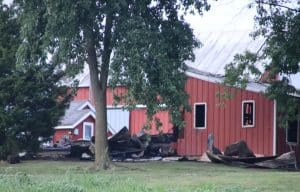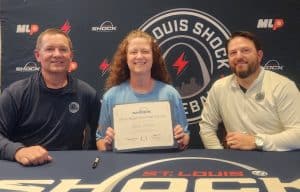Eggemeyer tells of WWII experiences
More than 13 million Americans put on military uniforms and fought the global war that was World War II. Those who gave up portions of their lives to stop tyranny from its power grab have been dubbed “The Greatest Generation.”
One of them is longtime Waterloo resident Norman Eggemeyer. In the summer of 1944, Eggemeyer was drafted at the age of 18. Secret planning was in final stages for D-Day, the invasion of Europe, and the Army – especially the infantry – was being bulked up for the battle ahead.
Only recently has Eggemeyer started to discuss his role in combat, and he shared some of those memories with the Republic-Times.
Eggemeyer related how his farm life prepared him well for the physical demands of infantry training at Fort Hood, Texas. Upon completing 17 weeks of intensive drilling and study, he was granted a 10-day home leave. That allowed one final step to prepare for going overseas.
“I paid my pastor at the Walsh Lutheran Church a visit,” he said. “I sought his counsel and prayers for what lay ahead of me. I asked that God would guide me and bring me home alive.”
His upbringing in Illinois prepared him in another way. He spoke fluent German.
“I was confirmed in High German,” he related. “And as much Low German was spoken around home as English.”
He would often be sent on patrols, because his German fluency made him invaluable in on-the-spot interrogation of German captives.
He traveled to the East Coast and sailed for England on the troop ship SS Wakefield. After a brief respite in England, Eggemeyer was sent to sea again for the short trip across the English Channel to LeHavre, France, then by truck to Metz, and finally on foot to the front lines where fighting already raged.
There, Eggemeyer was assigned as a replacement in the 87th Division of General Patton’s 3rd Army, to fill the gap left by casualties. He was detailed to the 347th Regiment, 3rd Battalion, Company K, 3rd Squad – a unit that had only three men left in it.
“Our officer in charge had perhaps 100 of us line up,” he said. “He looked at us and told us some of us would not make it
home.”
Somehow, perhaps because he was one of the first replacements, he was assigned a Browning Automatic Rifle that Eggemeyer credits with preserving his life. The BAR was a cross between a rifle and a machine gun. At 16 pounds, it was heavy, but Eggemeyer, at 155 farm pounds strong, was equal to the task.
“And I could hit what I shot at,” Eggemeyer affirmed.
Eggemeyer was sent into combat on a dark night and remembered lying in the dark some 100 feet into a wooded area.
“I heard noise close by – twigs breaking. Now, I was a farm boy and I knew what sounds meant at night. I quietly took a grenade from my belt, pulled the pin and silently threw it at the noise. It exploded and I don’t know if I hit anyone, but I could hear people running as fast as they could,” he told.
Shortly after, the German military launched an all-out offensive in an attempt to cut off Allied invasion supplies landing through Antwerp, Belgium, and to split U.S. and British forces. The attack would become known as the Battle of the Bulge, as heavy German forces pushed a large bend into Allied lines starting in December 1944 – creating a “bulge” in the front.
The Germans hoped to make the Allies believe they could not win the fight, and to negotiate a settlement that would enable them to turn their forces on the Russians.
Eggemeyer and fellow troops were moved into Belgium to blunt this offensive, and the magnitude of the attack was easily seen.
“There was a road on the next hill,” he related. “We could see one Red Cross truck after another on it, scurrying from the front lines with wounded and dead.”
There, Eggemeyer saw many Germans dead. They were frozen in the bitter cold that made it extremely difficult to function. One night, Eggemeyer related a story of never having been so cold.
“Luckily, no Germans attacked that night. I don’t know if I could have pulled the trigger if they had, or if my gun would even have fired,” he said.
Eggemeyer told of time after time instances he could have been killed.
“I was advancing with another soldier, through trees,” he said. “We heard an artillery shell screaming down upon us and it landed five feet away. When we both opened our eyes, we were shocked to see it had failed to explode – it was a dud!”
He also related a night when he was in a foxhole and an artillery round landed just in front of it. In the ensuing explosion – this one was not a dud – he was covered in flying dirt.
Another time during the Battle of the Bulge, Eggemeyer said he was entering a small town in Belgium and was 50 feet from a soldier in another squad. He took a direct hit from an artillery round.
“Some of his clothes were left on a clothesline,” Eggemeyer related grimly. “I don’t know where most of him went.
“We took sniper fire from church steeples. But we figured that out and as we got to towns, our tanks took them down. That stopped that.”
In addition to threats of enemy action, Eggemeyer told of health issues.
“It was cold. Bitterly cold. A lot of casualties were due to frozen feet,” he said. “But I learned very early, every time I stopped, I took off my boots and rubbed my feet.”
Eggemeyer’s unit received a Presidential Citation for taking the first town on the Siegfried line entering Germany — Ailmont. The Siegfried line was a primary German defensive line to protect their country. Thousands of concrete bunkers were in place and rows of concrete triangular pillars – aptly called dragon’s teeth – were aligned in front of them to stop or slow tanks.
As American forces entered Germany, at first, civilians disappeared ahead of them.
“But when they realized we were targeting military forces and were not there to rape and kill them, they started to reemerge,” Eggemeyer told.
Later in the war, in fact, German soldiers would leave eastern lines and come west to surrender to American and British forces rather than Russian — knowing they’d be treated in accordance with Geneva Convention rules.
Death is a fact of war. Part of that is killing. Eggemeyer acknowledged he killed German soldiers and warned civilians not to take action against our troops.
“I was a good shot. What I shot at with my BAR, I hit,” he said.
He told of one specific incident in which he was advancing carefully through a town in Germany that had just been vacated by German troops.
“As I moved forward, I could see a German Army uniform sticking slightly out of a doorway. I could not see what weapon he had, but I was interested in my own life and that of troops with me,” Eggemeyer said. “So I aimed and fired. He came tumbling out of the doorway and hit the ground.
“Two German females came out screaming that I had just killed their brother and he was home on furlough. But I knew in my heart that he was a soldier, and even if he was on home leave, he would’ve returned to his unit and might have killed a fellow soldier or even me. It was often a matter of them or us.”
Eggemeyer also acknowledged being wounded.
“I didn’t get a Purple Heart,” he said.
The bullet tore through his shirt sleeve.
“It left a burn mark. But I was 19 at the time and wasn’t much concerned,” he said.
Eggemeyer received several field promotions in combat, all the way up to sergeant. But all such promotions were administratively canceled – so Eggemeyer officially was again a private.
“I didn’t care at the time. I was just glad to be alive,” he said, smiling.
His division, the 87th, was shipped home and the good news was that all soldiers were given 30 days of leave. The bad news was that they would reassemble on the west coast and be one of two divisions slated to take part in the invasion of the Japanese home islands.
But while he was on leave, two atomic bombs convinced Japan to surrender.
“I was sent to Camp Blanding in Florida for a few weeks, and then discharged,” Eggemeyer remembers.
Upon his return home, one of the first stops Eggemeyer made was to his church, where he asked his pastor – the same one he had asked to pray for his safe return – to pray for God’s forgiveness for the many acts he had to commit to be able to come home.
“I know God steered me through the fighting and brought me home,” he said.
Eggemeyer said he never discussed the war with anyone, not even his parents, until recently.
“My children are getting me to open up now,” he said. “I realize my story is one I must share, and I am trying to do so.”
Eggemeyer ended up working for Union Pacific Railroad after the war.
It was good, honest work Eggemeyer earned the right to do by his service and served him well through some 35 years.






